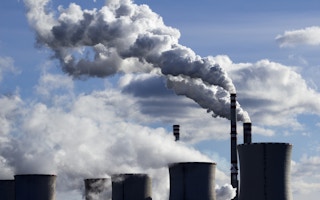Korea Electric Power Corporation’s (Kepco), South Korea’s largest state-owned electric power distribution firm, is to proceed with the proposed Vung Ang 2 coal power project in Vietnam, the company has announced.
The firm’s involvement in the plant’s construction was approved by its board of directors on Monday (5 October), Korean media reported. The total project cost is an estimated US$2.2 billion and Kepco is seeking to buy a 40 per cent stake in the venture for 220 billion won (US$189 million).
According to the Korea Economic Daily, Kepco’s decision means that Samsung C&T, the Samsung Group’s construction arm, and Doosan Heavy Industries & Construction, a major Korean coal plant maker hit hard by the coronavirus-induced economic slump, will participate in the project as engineering, procurement and construction contractors.
In addition, Korean government-owned banks Export-Import Bank (Kexim) and Korea Trade Insurance Corporation (Ksure) will fund the venture, the news outlet said. No details have been revealed on the loans the two lenders will provide.
Vung Ang 2, sited in the Vietnamese province of Ha Tinh, has been repeatedly targeted by environmental groups over the years for its potential to aggravate air pollution and fuel global warming. Campaigners have also highlighted that the 1,200-megawatts (MW) project has pollution standards far lower than those in South Korea.
Kepco’s announcement comes as a political rift begins to form in South Korea—the world’s third-biggest public financier of coal projects—between the Korean administration and the National Assembly over the country’s climate policy and coal development beyond its borders.
Amid increasingly dire warnings of climate change, both politicians and activists have warned that South Korea’s ongoing investments in coal—the world’s dirtiest fossil fuel—threatens to damage the nation’s image on the world stage.
In response to mounting pressure, Korean lawmakers proposed new legislation in July that would prohibit public firms like Kepco from pouring money into coal projects overseas, citing financial and reputational risks and the need to tackle global heating.
Last month, the National Assembly took ambitions further and declared a climate crisis, establishing a non-binding goal of reaching net-zero emission by mid-century and urging the government to submit a new climate pledge to the international community. 252 out of 258 lawmakers voted in favour of the resolution.
But on 14 September—just 10 days before the resolution was passed—Korean ministers decided behind closed doors that the country would continue exporting coal-fired power plants, said Joojin Kim, managing director of Seoul-based climate policy group Solutions for Our Climate. A government spokesperson reportedly said after the meeting that it was “difficult” to reduce thermal power development in developing countries such as Vietnam.
“There is a sizable group of legislators in the National Assembly that are trying to put a cap on overseas coal financing. However, the administration appears to have a different opinion on this,” Kim told Eco-Business.
Meanwhile, experts have rung the alarm bells over the financial risks linked to coal. A pre-feasibility study by Korea Development Institute, an autonomous policy-oriented research organisation, found in June that the net value of the Vung Ang 2 project stood at negative $158 million. Kepco alone stands to incur financial losses of US$84 million.
Kepco’s decision to pursue the venture despite the perils involved is set to draw fierce criticism from shareholders, which include BlackRock. In May, the world’s top asset manager raised concerns over coal projects that Kepco is backing. A number of financial institutions including Standard Chartered Bank and OCBC Bank have pulled out of Vung Ang 2.
In June, Kepco’s board of directors greenlighted its stake in another major coal venture, the 2000-MW Jawa 9 and 10 coal coal-fired power project near the Indonesian capital Jakarta, which will see the firm invest US$51 million in addition to providing a shareholder loan guarantee of US$250 million. The venture is slated to be in operation from 2024.
That Kepco and Korean government-owned lenders move ahead with yet another controversial coal project shows “how far South Korea’s climate talk is away from its walk”, said Kim. If the country continues to pursue risky, planet-heating investments, it will not be able to shed its title of “climate villain”, he observed.
“Decisions like Kepco’s today, which will add more than 200 million tons of greenhouse gas emissions to our atmosphere, are devastating our climate and fly in the face of Korea’s recent ‘climate emergency’ declaration. These emissions eclipse the 12.3 million tons in emissions reductions that we can expect from the newly announced Korean Green New Deal,” he said.
The news of Samsung C&T’s link to the construction of Vung Ang 2 first emerged two months ago and sparked widespread outcry around the world, with protests held at the electronics giant’s stores in the United Kingdom, the United States, Japan, the Philippines and South Korea.
Campaigners have pointed out that Samsung’s involvement in the venture runs counter to group-level sustainability pledges, which include reducing greenhouse gas emissions. Kim commented it was “alarming” that the Samsung Group was willing to let its construction arm “tarnish its global brand”.
In March this year, President Moon Jae-in’s Liberal Party of Korea unveiled its Green New Deal package, a collection of sweeping green policies aimed at curbing South Korea’s contribution to climate change, as part of its election manifesto. But up until now, the government has largely failed to adopt the promised green policies.
Seven coal power stations are currently under construction in South Korea, and whether the ban on overseas coal financing gets passed into law remains to be seen. The government’s recent decision to bail out Doosan Heavy Industries suggests it may at present be more inclined to lift its battered economy back onto its feet rather than overhaul it.
Kepco’s announcement comes a week after KB Financial, one of Korea’s biggest finance groups, became the first Korean bank to scrap investments in new coal-fired power projects. The lender said investments would be redirected towards low-carbon and renewable energy initiatives to better align its operations with the Paris Agreement on climate change.

















